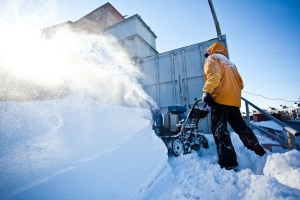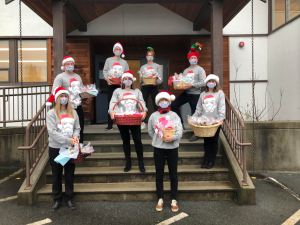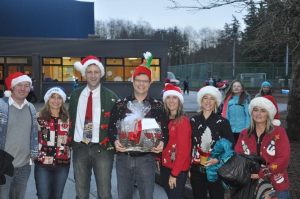When you are known for technology and innovation, you experience this ongoing mix of excitement and adrenalin at some points of the year and anxiety and worry at other points.
The question I get asked most is – “So, what’s next?” I usually just want to snap back, “Come on, can we just do what we are doing for a minute before thinking about what’s next.” But that is not our world, and if we want schools and learning to continue to be relevant for all learners we need to push the boundaries of what we are doing.
With that as an intro, I want to share today what I see as three of the next big moves for our schools. I am not ready to make any announcements today, but when people ask “just what do those people at the Board Office do?” – the answer as one of “those people” is: I am working on these three strategic initiatives.
- Fully Virtual Reality Classrooms. There is lots in the news about the space crunch in schools. School construction is not keeping up with population growth and school districts are looking at a variety of new schedules to accommodate all the learners. We are looking to do something a bit different. We are considering having half of all high school classes occur in a virtual reality environment. This means you would spend half the time in a physical class, with the other half students will be wearing their VR glasses and haptic feedback suits and won’t need to physically present in the school building. Art classes will occur in the great galleries of our world, biology classes will be under the sea and history classes will take place throughout Asia and Europe. We will need half as many classrooms and schools with this new model.
- Anti-Gravity Physical Education Programs. Obviously health and wellness is top of mind for students and families. We have worked hard to lead the physical literacy work in British Columbia and across Canada. And this year the Feeding Futures Program had helped solidify the work. There is a lot of research on the advantage of doing athletic activity in an anti-gravity environment. We would look to convert one of the gyms in each high school to an anti-gravity chamber, allowing students to experience sports like basketball and volleyball without the constraints of gravity. If the research is true, this will see tremendous gains for our students in balance and spatial awareness among other key development skills.
- Time Travel Field Trips. I am most excited about this option. I know, this sounds like some crazy science fiction, but for those who have been following along with the developments in artificial intelligence, you know this is likely going to be possible in the next several years, and we want to be at the front edge of this in West Vancouver. We are partnering with Loof Lipra Technologies out of Sweden. The idea would be that students could travel to different historical periods using cutting edge time travel technologies. In addition to the traveling back in time we are also working with our Robotics teachers on travel to the future. Our students will be able to learn about careers that don’t even exist now! While not quite ready for testing yet, we would see our students currently in elementary school being able to have these kinds of experiences before they graduate grade 12. The opportunity for our students to not just read or watch history but be part of history is something that is tremendously exciting. And experiencing the future first-hand could inspire students to explore new opportunities and industries.
I do like to use this space to be transparent with the thinking of what is coming next. While some might worry that others will steal their ideas, I think it is important to share key directions. And especially at this time of year I have tried to make it a habit. We know once we move to VR Learning, Anti-Gravity classrooms and time traveling field trips other will follow. Sometimes you have to be first – and that is the blessing and the curse of being us.
To catch you up on some of the other innovations I have shared in recent years, here is a list:
In 2012 I launched my FLOG.
In 2013 I made the announcement of Quadrennial Round Schooling.
In 2014 we formalized our System of Student Power Rankings.
In 2015 we created our Rock, Paper, Scissors Academy.
In 2016 we piloted the Drone Homework Delivery System.
In 2017 we introduced the Donald J. Trump Elementary School of Winning.
In 2018 we announced the construction of Soak City Elementary.
In 2019 we went back to the 80’s with the launch of the Belvedere Learning Academy.
In 2020 we embraced the latest in learning styles with our PBL (Pajama-Based Learning) Program.
In 2021 we announced we were going out of this world with our Galaxy High Program.
In 2022 we modernized our schools with New Nicknames for All of Our Schools.
And just last year in 2023 we embraced our expanded mandate with our Animal Kingdom Academy.
Happy April Fools’ Day, everyone! While this might not all really be in the strategic plan yet, it is fun to think about what might be. Here’s to a future where education knows no bounds, and where we’ll keep dreaming big and embracing the endless possibilities that lie ahead.
This blog post was assisted by Chat GPT. The ideas were refined through a series of prompts with Chat GPT 4.0 and the image accompanying the blog was generated by pasting the post into Chat GPT 4.0 and asking for suggested images. In an effort to be transparent with my own learning with generative AI, I will include a reference at the end of any posts that I used AI assistance.





























